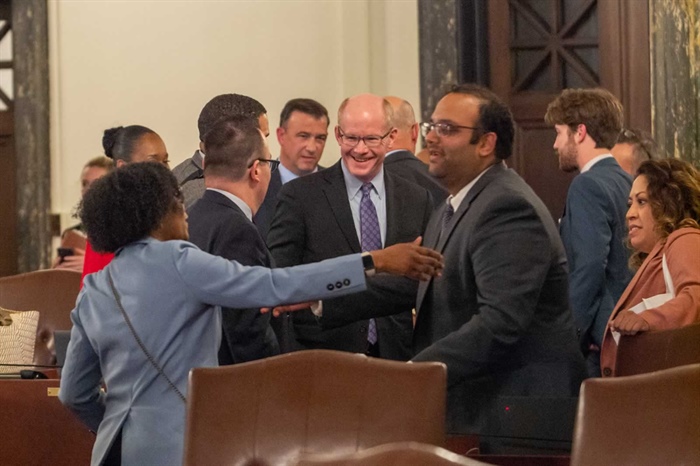Senate sends $53.1 billion spending plan to House

Two days after the General Assembly was scheduled to adjourn its spring session, Democrats in the Illinois Senate advanced a $53.1 billion budget to the House Sunday night, where leaders expect it to pass without changes.
The fiscal year 2025 spending plan, which came together over a stretch of late nights and closed-door dealmaking, spends $700 million more than what Gov. JB Pritzker proposed in his February budget address.
Despite controlling the governor’s mansion and both chambers of the legislature, Democrats had a rocky time coming to an agreement, as evidenced during floor debate of the bill. In a rare move, a few Democrats publicly aired their disappointment with their party’s budget priorities before ultimately voting for it, while a pair of Democrats quietly voted no.
“I wish this were a perfect budget,” lead budget negotiator Sen. Elgie Sims, D-Chicago, said before the vote. “I’ve been here many years and I have yet to see one. But…this budget is fair, it’s balanced, and it provides certainty for us investing in our future.”
The budget, which is set to take effect on July 1, would increase spending by 5 percent from last year’s enacted budget, but just 1.6 percent when factoring in supplemental spending for the current year. It also reduced spending in several areas from Pritzker’s February budget proposal by a total of about $73 million, according to Sims, although Democrats did not provide a list of the cuts.
The spending plan directs a $350 million increase for K-12 education and full funding for year two of Pritzker’s “Smart Start” plan aimed at adding 5,000 preschool seats across the state and providing workforce grants. The plan would send $198 million to the state’s “rainy day” fund and make the full pension payment required by law.
The budget also includes a child tax credit for qualifying children under the age of 12, providing parents a credit of 20 percent of the state’s Earned Income Tax Credit in calendar year 2024 and 40 percent in 2025. That would come at a cost of $50 million in FY25 and $100 million the following year, up from the $12 million proposed by Pritzker.
It includes the $182 million Pritzker committed months ago to provide shelter, health care and other services for recently arrived migrants, many of whom have been bused to the state from Texas. Two programs providing state-funded Medicaid-like benefits to noncitizens would receive $440 million from the General Revenue Fund, or $629 million total with other state funds. It’s an overall funding increase from what was allocated in this year’s budget, although the GRF commitment would be smaller in FY25.
The spending plan on a 38-21 vote, with Democrats Patrick Joyce, D-Essex, and Suzy Glowiak-Hilton, D-Western Springs, joining Republicans in opposition. A third Democrat, Sen. Meg Loughran Cappel, D-Shorewood, later voted against a revenue bill that raised certain taxes.
Republicans accused Pritzker of being driven by presidential aspirations and criticized him for growing state spending by about $13 billion since his first year in office in 2019.
“Gov. Pritzker has made it abundantly clear that Illinoisans are not his priority. They are, rather, a source of tax dollars he returns to again and again – this year, to pay for a record-setting $53 billion budget. This year, he has raised our taxes by nearly $1 billion to pay for the thousands of noncitizens that have come to Illinois at his invitation,” Sen. Jil Tracy (R-Quincy) said. “Pritzker continues to focus on free healthcare, housing, and social services for noncitizens, when his budget priorities should be Illinoisans and their families.”
“Under this budget, Illinois residents are treated as second-class citizens while illegal immigrants receive highly sought-after care, depriving our own residents of essential services, Sen. Neil Anderson (R-Andalusia) said. “This budget alone contains nearly a billion dollars in tax hikes all to fund Governor Pritzker self-created illegal immigrant crisis.
“Despite being one of the highest-taxed states in the nation, it’s clear that our state doesn’t have a revenue problem, but rather the left has a serious spending problem. State spending alone, driven by this Governor and his democratic allies, has increased an egregious 32 percent since taking office—a recording setting increase. The Democrats call this a ‘responsible’ budget, but their words are misleading and their policies thrive on smooth rhetoric and public apathy.”
But the GOP also criticized Democrats for underfunding state and federally mandated programs at K-12 schools by $135 million from what the state education board requested. And they panned the governor for allocating about 17 percent less than the current year to the Prisoner Review Board.
“I’m a little confused,” Sims said during floor debate. “Because I couldn’t really understand if you want more spending or less.”
Some Democrats also lamented that “finite resources” prohibited greater investments in youth-focused programing.
“While I rise to acknowledge there are incredible things inside of this budget, many good things, I cannot – my conscience won’t allow me to sit in this seat and not lift up the fact that we have not gone far enough for a particular group, which are young, poor, Black people and Latinos,” Sen. Willie Preston, D-Chicago, said.
The budget includes a $1 per hour increase in wages for direct service professionals in community-based settings that serve individuals with intellectual and developmental disabilities. Community Care Program workers who serve older adults who can’t live independently will see a rate increase as well.
Revenue changes
The budget anticipates $53.3 billion in revenue for the fiscal year that will begin on July 1, about $1.2 billion of which comes from various tax code changes.
The revenue plan was part of why the spring legislative session went beyond Democrats’ May 24 self-imposed deadline written into the calendar months ago, as powerful Statehouse lobbying groups lined up against some of its components. But ultimately, it tracks closely with the governor’s proposal.
“Every session I found has its own rhythm and each budget is its own beast. And this one was a doozy,” Senate President Don Harmon, D-Oak Park, said just before the Senate adjourned. “There is no doubt about that.”
It extends a cap on corporate net operating losses to generate $526 million and imposes a new graduated tax on sportsbooks, increasing it from the current 15 percent to a new range between 20 and 40 percent, which is estimated to generate $200 million next year. The tax rate on Illinois’ video gambling industry would also see a 1 percent increase, which goes toward infrastructure spending.
Pritzker had also sought a $1,000 monthly cap on the “retailers’ discount,” which was included in the plan. The discount allows retailers to keep 1.75 percent of the sales tax they collect but capping it at $1,000 monthly would bring in $101 million for the state’s general fund. Third-party “re-renters” of hotel rooms will also be subject to the existing hotel tax under the plan.
To appease retailers, lawmakers included a prohibition that bans financial institutions and credit card companies from charging fees on the sales tax portion of electronic transactions.
The personal income tax was not affected by the law, as the approved budget didn’t decrease the standard deduction claimed by millions of Illinoisans, as Pritzker had proposed in February.
The budget package also calls for transferring $150 million from the state’s Road Fund to public transit expenses, freeing up general funds for other purposes in a move that was opposed by the state’s road builders.
The revenue proposal would also create a $5 million tax credit program for news outlets beginning in 2025 and claimable the following year, providing $15,000 per employee for certain newsrooms and another $10,000 for new hires. Another $50 million from the little-used Leaking Underground Storage Tank fund will be directed to public transit spending as well.
Grocery tax authority
The plan would eliminate the state’s 1 percent tax on grocery items as sought by Pritzker – a tax that benefits the state’s municipalities, rather than state government. Groups like the Illinois Municipal League pushed back against the repeal – though they supported the extra $85 million in revenue for local governments that would result from the retailers’ discount cap.
The grocery tax repeal was also pushed back to Jan. 1, 2026, and the bill allows local governments to implement their own grocery taxes up to 1 percent without a referendum and without requiring state administrative fees. Municipalities with home rule authority would be allowed to increase their sales tax by up to 1 percent without a referendum.
“Only in Springfield are we going to do a victory lap that really just reassigns the blame and responsibility to local municipalities and call it a tax cut,” Sen. Andrew Chesney, R-Freeport, said of the measure to increase local taxing authority.
The House is slated to return as early as Tuesday to consider the spending plan and associated measures. In an interview after Sunday evening’s spending plan vote, Sims told reporters there was agreement between Democrats in the House and the Senate that there would be no further amendments.
“So I would expect the bill that you just saw us vote on be the budget in the state of Illinois come July 1,” he said.
Hannah Meisel contributed.
Capitol News Illinois is a nonprofit, nonpartisan news service covering state government. It is distributed to hundreds of newspapers, radio and TV stations statewide. It is funded primarily by the Illinois Press Foundation and the Robert R. McCormick Foundation, along with major contributions from the Illinois Broadcasters Foundation and Southern Illinois Editorial Association.
Miss Clipping Out Stories to Save for Later?
Click the Purchase Story button below to order a print of this story. We will print it for you on matte photo paper to keep forever.

